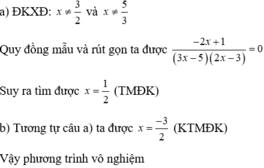

a)
4...">
Hãy nhập câu hỏi của bạn vào đây, nếu là tài khoản VIP, bạn sẽ được ưu tiên trả lời. a)\(2+\frac{3}{x-5}=1\) \(\Rightarrow\frac{3}{x-5}=-1\) \(\Rightarrow3=-x+5\) \(\Leftrightarrow x+3=5\) \(\Rightarrow x=2\) a) 7x - 35 = 0 <=> 7x = 0 + 35 <=> 7x = 35 <=> x = 5 b) 4x - x - 18 = 0 <=> 3x - 18 = 0 <=> 3x = 0 + 18 <=> 3x = 18 <=> x = 5 c) x - 6 = 8 - x <=> x - 6 + x = 8 <=> 2x - 6 = 8 <=> 2x = 8 + 6 <=> 2x = 14 <=> x = 7 d) 48 - 5x = 39 - 2x <=> 48 - 5x + 2x = 39 <=> 48 - 3x = 39 <=> -3x = 39 - 48 <=> -3x = -9 <=> x = 3 1) (2x - 3)2 = 4x2 - 8 <=> 4x2 - 12x + 9 = 4x2 - 8 <=> 12x + 9 = -8 <=> 12x = -17 <=> x = 17/12 1) (2x - 3)^2 = 4x^2 - 8 <=> 4x^2 - 12x + 9 = 4x^2 - 8 <=> 4x^2 - 12x + 9 - 4x^2 = -8 <=> -12x + 9 = -8 <=> -12x = -8 - 9 <=> -12x = -17 <=> x = 17/12 2) x - (x + 2)(x - 3) = 4 - x^2 <=> x - x^2 + 3x - 2x + 6 = 4 - x^2 <=> 2x - x^2 + 6 = 4 - x^2 <=> 2x - x^2 + 6 + x^2 = 4 <=> 2x + 6 = 4 <=> 2x = 4 + 6 <=> 2x = 10 <=> x = 5 3) 3x - (x - 3)(x + 1) = 6x - x^2 <=> 3x - x^2 - x + 3x + 3 = 6x - x^2 <=> 5x - x^2 + 3 = 6x - x^2 <=> 5x - x^2 + 3 + x^2 = 6x <=> 5x + 3 = 6x <=> 3 = 6x - 5x <=> 3 = x 4) 3x/4 = 6 <=> 3x = 6.4 <=> 3x = 24 <=> x = 8 5) 7 + 5x/3 = x - 2 <=> 21 + 5x = 3x - 6 <=> 5x = 3x - 6 - 21 <=> 5x = 3x - 27 <=> 5x - 3x = -27 <=> 2x = -27 <=> x = -27/2 6) x + 4 = 2/5x - 3 <=> 5x + 20 = 2x - 15 <=> 5x + 20 - 2x = -15 <=> 3x + 20 = -15 <=> 3x = -15 - 20 <=> 3x = -35 <=> x = -35/3 7) 1 + x/9 = 4/3 <=> x/9 = 4/3 - 1 <=> x/9 = 1/3 <=> x = 3 a) đặt \(\left(x^2+x\right)\)là \(y\) ta có: \(3y^2-7y+4\)\(=0\) <=>\(\left(3y-4\right)\left(y-1\right)=0\) còn lại bạn tự xử nhé Nhìn sơ qua thì thấy bài 3, b thay -2 vào x rồi giải bình thường tìm m Bài 2: a) \(x+x^2=0\) \(\Leftrightarrow x\left(x+1\right)=0\) \(\Leftrightarrow\hept{\begin{cases}x=0\\x+1=0\end{cases}}\)\(\Leftrightarrow\hept{\begin{cases}x=0\\x=0-1\end{cases}}\)\(\Leftrightarrow\hept{\begin{cases}x=0\\x=-1\end{cases}}\) b) \(0x-3=0\) \(\Leftrightarrow0x=3\) \(\Rightarrow vonghiem\) c) \(3y=0\) \(\Leftrightarrow y=0\) Bài 3: a) \(\left(x-6\right).\left(2x-5\right).\left(3x+9\right)=0\) \(\Leftrightarrow\left(x-6\right).\left(2x-5\right).3.\left(x+3\right)=0\) Vì \(3\ne0.\) \(\Leftrightarrow\left[{}\begin{matrix}x-6=0\\2x-5=0\\x+3=0\end{matrix}\right.\Leftrightarrow\left[{}\begin{matrix}x=6\\2x=5\\x=-3\end{matrix}\right.\Leftrightarrow\left[{}\begin{matrix}x=6\\x=\frac{5}{2}\\x=-3\end{matrix}\right.\) Vậy phương trình có tập hợp nghiệm là: \(S=\left\{6;\frac{5}{2};-3\right\}.\) b) \(2x.\left(x-3\right)+5.\left(x-3\right)=0\) \(\Leftrightarrow\left(x-3\right).\left(2x+5\right)=0\) \(\Leftrightarrow\left[{}\begin{matrix}x-3=0\\2x+5=0\end{matrix}\right.\Leftrightarrow\left[{}\begin{matrix}x=3\\2x=-5\end{matrix}\right.\Leftrightarrow\left[{}\begin{matrix}x=3\\x=-\frac{5}{2}\end{matrix}\right.\) Vậy phương trình có tập hợp nghiệm là: \(S=\left\{3;-\frac{5}{2}\right\}.\) c) \(\left(x^2-4\right)-\left(x-2\right).\left(3-2x\right)=0\) \(\Leftrightarrow\left(x^2-2^2\right)-\left(x-2\right).\left(3-2x\right)=0\) \(\Leftrightarrow\left(x-2\right).\left(x+2\right)-\left(x-2\right).\left(3-2x\right)=0\) \(\Leftrightarrow\left(x-2\right).\left(x+2-3+2x\right)=0\) \(\Leftrightarrow\left(x-2\right).\left(3x-1\right)=0\) \(\Leftrightarrow\left[{}\begin{matrix}x-2=0\\3x-1=0\end{matrix}\right.\Leftrightarrow\left[{}\begin{matrix}x=2\\3x=1\end{matrix}\right.\Leftrightarrow\left[{}\begin{matrix}x=2\\x=\frac{1}{3}\end{matrix}\right.\) Vậy phương trình có tập hợp nghiệm là: \(S=\left\{2;\frac{1}{3}\right\}.\) Chúc bạn học tốt!






